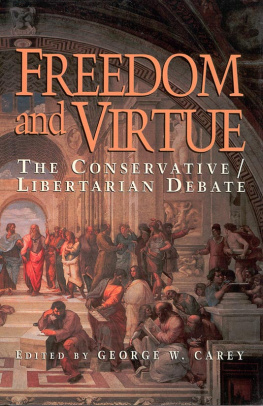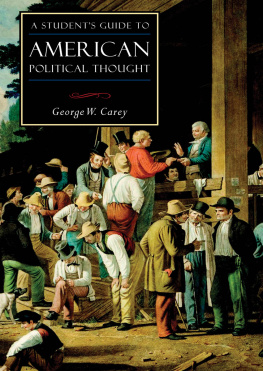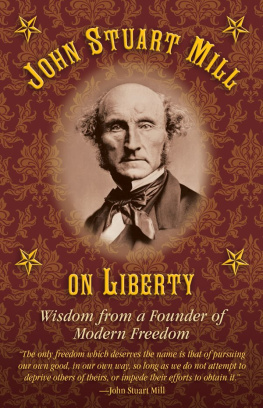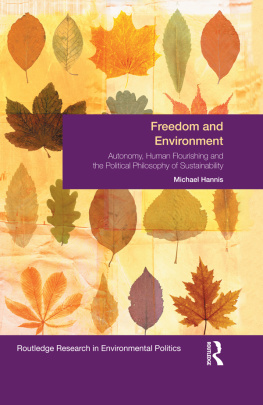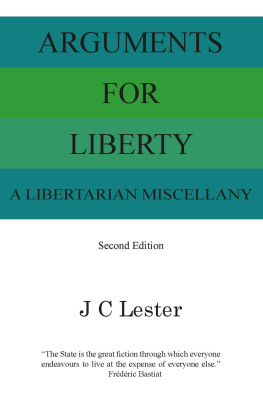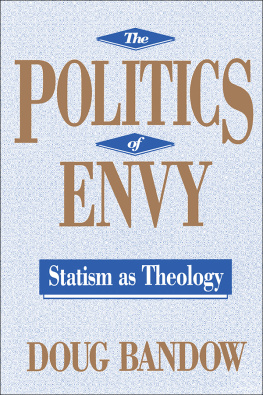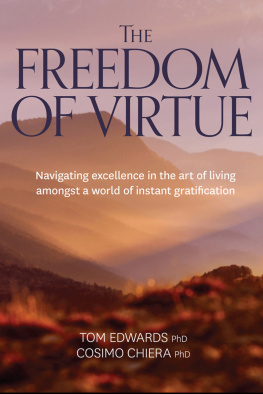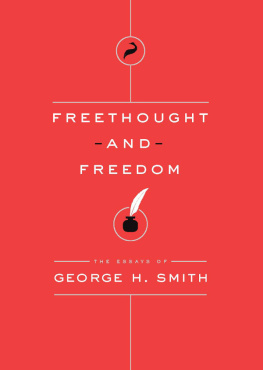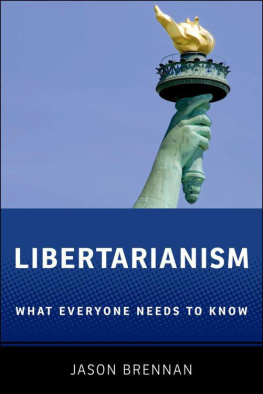All rights reserved, including without limitation the right to reproduce this ebook or any portion thereof in any form or by any means, whether electronic or mechanical, now known or hereinafter invented, without the express written permission of the publisher.
Copyright 1998 by the Intercollegiate Studies Institute
First edition, Copyright 1984 by ISI, Inc. and University Press of America
Published by ISI Books
Intercollegiate Studies Institute
3901 Centerville Road
Wilmington, DE 19807-1938
www.isibooks.org
Distributed by Open Road Distribution
345 Hudson Street
New York, NY 10014
www.openroadmedia.com
Acknowledgments
The editor wishes to acknowledge that permissions have been granted for the reprinting of the following essays:
Do-It-Yourself Conservatism?, M. Morton Auerbach vs. M. Stanton Evans, Frank S. Meyer, and Russell Kirk, appeared first in the January 30, 1962 issue of National Review.
The Twisted Tree of Liberty by Frank S. Meyer was first published in the January 16, 1962 edition of National Review.
Freedom or Virtue? by L. Brent Bozell first appeared in National Review on September 1, 1962.
Conservatism and Libertarianism by Richard M. Weaver was originally published in the May 1960 issue of The Individualist.
Freedom and Virtue: Allies or Antagonists? and Love versus Freedom originally appeared in the Spring 1995 issue of the Intercollegiate Review as Freedom or Virtue? An Exchange between Doug Bandow and Frederick D. Wilhelmsen, respectively.
The following essays have been abridged for this edition:
Conservatism and Libertarianism: Vital Complements by John P. East; Differences of Theory and Strategy by John Hospers; Libertarianism as the Philosophy of Moral Freedom: A Response by Edward B. McLean.
A Dispassionate Assessment of Libertarians by Russell Kirk replaces his essay, Libertarians: The Chirping Sectaries. This essay first appeared in his book, The Politics of Prudence (Bryn Mawr: Intercollegiate Studies Institute, Inc., 1993).
Introduction
GEORGE W. CAREY
The reception accorded the first edition of these essays clearly indicates a widespread and intense concern about the relationship between freedom and virtue. While, to be sure, this relationship is interesting to thoughtful students of virtually every political persuasion, it is of special importance for American conservatives and libertarians because it has been, and continues to be, a source of great controversy. At the philosophical level, at least, it serves to divide the conservative/libertarian alliance that has long resisted the growth of the liberal welfare state. As liberalism wanes and public policy formation is increasingly driven by conservative and libertarian values, this schism promises to become even wider.
In its broadest terms, the freedom/virtue debate can be understood as arising from the primacy accorded individual liberty in libertarian thought. Libertarians, as certain of the following essays will make abundantly clear, share John Stuart Mill's view concerning the nature and limits of the power which can be legitimately exercised by society over the individual;
These principles, we should note, far from being lofty and abstract precepts, formed the basis for what is known as classical liberalism that flourished in England and the United States during the late nineteenth and early twentieth centuries. The goal of classical liberalism is the maximization of individual liberty in both the political and economic spheres. Unlike contemporary American liberals or progressives, classical liberals resist governmental rules and regulations, holding that individual liberty is best served by minimal government.
The vast majority of conservativescertainly the traditionalists or paleoconservatives, but also the neoconservativeswhile concerned with individual liberty, strongly believe that shared values, morals, and standards, along with accepted traditions, are necessary for the order and stability of society; that, moreover, without these socially cohesive elements, the environment necessary for the moral and intellectual development of individuals is seriously lacking. They stress as well the need for virtue, a problem particularly acute in republican regimes where the people ultimately rule. They would agree with the point made by James Madison in an oft-quoted passage at the conclusion of Federalist paper essay 55; namely, a Republican government presupposes the existence of the benign qualities of human nature in a higher degree than any other form.
Conservatives have long accepted the teachings of the classics that underscore the need for regimes to cultivate and perpetuate the virtues appropriate for their character, if they are to endure. But we do not have to bring the classics to bear to understand the concerns of modern conservatives in this regard. As those familiar with the American tradition know, a concern with the virtues necessary for a republican regime arises at various points in our political tradition, particularly during the formative years of the republic. And, to a surprising degree, the views and concerns of the commentators of this period reflect those of contemporary American conservatism. Jeremiah Atwater, for instance, acknowledging that the United States at that time (1801) enjoyed a mild and free government, proceeds to ask: to what is this owing? Is it, he asks rhetorically, that man needs no restraint; but will, unless made vicious by government, always act as a reasonable being, and be obedient and virtuous, because it is his highest interest to be so? Atwater observes that this answer is based upon a theoretical idea that embodies a false understanding of human nature. As he would have it, the virtuous citizen is formed by restraints, not unrestricted liberty. Man, he writes, from cradle to grave, is constantly learning new lessons of moral instruction, and is trained to virtue and order by perpetual and salutary restraints; restraints imposed by the family, by the schools, by government and laws, and even by public opinion, which, in a country where Christianity is believed, compels even profligates to be outwardly virtuous.
Like most modern conservatives, many of the religious and civil leaders of this earlier period believed that an aspect of the public virtue consisted in shared values and a common morality that would, in the words of Zephaniah Swift Moore (the first president of Amherst College), provide a uniform direction of the public will to that which is good.
These concerns and observations, aside from embodying enduring elements of conservative belief, point to the underlying reasons why many contemporary conservatives believe that we are facing a social crisis of perhaps unprecedented proportions. These conservatives believe that the damage to the fabric and cohesiveness of society due to the loss of virtue and a common morality, is even more devastating than that anticipated by Atwater, Moore, Kendal, and others.
A host of works, far too numerous to deal with here, have concentrated on one or more aspects of this social degeneration. Most seem to be in agreement that the down hill slide began to accelerate at an alarming rate sometime in the late 1960's. Many of these critics would accept the scenario painted by the

